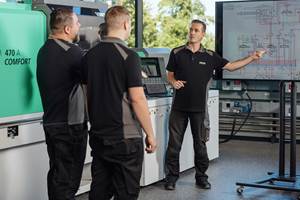TV Ad Sells Anti-Manufacturing Bias?
A new TV ad celebrates women’s opportunities for professional advancement. But does it hint that manufacturing isn’t one of those opportunities?

This popular WWII poster celebrated women’s contribution to the strength of American manufacturing. (Image: KingWu/Getty Images)
I saw a clever ad on TV recently for the online . Actually, I’ve seen it several times, which prompted me to think about its message, playing upon twin themes of feminism and workforce development.
In case you haven’t seen it, this is a 30-second short story told in anime-style animation. First scene: Young woman concentrating on precise operation of a drill press in a manufacturing shop. She looks to the side and sees engineers installing a six-axis robot.
Second Scene: Quick cut between an overhead view of a shop full of people at metalworking machines and one robot—to a room with several robots and just the one young woman at her drill press. Cut to close-up of her at her press, and suddenly she notices a man in a suit standing behind her (his face not visible). A look of alarm crosses her face.
Third Scene: Young woman at home looking dejected, young son runs up and hugs her. She sees a cardboard carton holding her possessions from the metal shop, including an old WWII poster of the lady dressed in overalls flexing her biceps (often known as “Rosie the Riveter”), with the message, “We Can Do It!” A sudden thought narrows the young mother’s brows.
Fourth Scene: Young woman signs up for Bachelor of Science in Information Technology online program at U. of Phoenix. Cut to her wearing traditional graduate’s mortarboard hat, celebrating her “graduation” in her kitchen with a cake on the table.
Fifth Scene: Young woman smartly dressed in “大象传媒 casual” clothes sitting in an office cubicle at a desk with a computer screen, rolling up her sleeves (literally). She spots her old “We Can Do It!” poster, which she pasted on her cubicle wall, and corrects it with a marking pen to read, “We Can Do IT.” Cut to young lady standing in an aisle between rows of tall mainframe computer cabinets. She pushes some buttons, and little lights start blinking all around her.
Clever ad, undeniably, and a worthwhile message about self-improvement through vocational education. But one thing bothered me. Wouldn’t it have been a less radical leap for the young woman to get trained in robot maintenance and/or programming? Or maybe learn to program and/or operate an automated machining center? Why was it necessary for her to shift from a manufacturing company to what appears to be a data service company?
U. of Phoenix does not appear to teach manufacturing subjects, so it can’t very well advertise them. But it still seems to me, whether intended or not, that this ad betrays a hint of the anti-manufacturing bias that is all too common in the U.S. today. The ad’s message seems to be: Get out of a mechanical shop that makes things and into a sterile environment where the only things that move are the blinking status lights on the mainframe cabinets and the hard drives whirring unseen behind them.
There are still plenty of plastics plants that are noisy and cluttered and in need of serious housekeeping. But, as a reader of this magazine, you’ve also seen every month facilities that are clean and spacious and well lit, where automation takes care of “mindless” jobs—and more back-breaking ones—while many or most workers use computers (including mobile devices) to manage all this technology. Automation, AI, IT, MES/ERP, VR—these technologies, and more, increasingly define manufacturing today, plastics and otherwise. In fact, advanced information and communication technologies are the essential keys to unlocking job growth and competitiveness for American industry. And there are plenty of places where men and women can learn those skills—and even earn a salary while doing it.
Related Content
PolyJohn Turns to Blow Molding, Doubles Its Productivity
Leading maker of portable sanitation products knew thermoforming, sheet extrusion, rotomolding and injection molding. Then it found the missing link to higher productivity and new markets: blow molding.
Read More'Smart,' Moisture-Based Drying Technology Enhanced
At NPE2024, Novatec relaunches DryerGenie with a goal to putting an end to drying based on time.
Read MoreConair: Going All In on AI
Conveying with Optimizer, Conair’s new AI-based conveying technology stands to be a true game changer for plastics processors.
Read MoreFive Ways to Increase Productivity for Injection Molders
Faster setups, automation tools and proper training and support can go a long way.
Read MoreRead Next
See Recyclers Close the Loop on Trade Show Production Scrap at NPE2024
A collaboration between show organizer PLASTICS, recycler CPR and size reduction experts WEIMA and Conair recovered and recycled all production scrap at NPE2024.
Read MoreLead the Conversation, Change the Conversation
Coverage of single-use plastics can be both misleading and demoralizing. Here are 10 tips for changing the perception of the plastics industry at your company and in your community.
Read More











